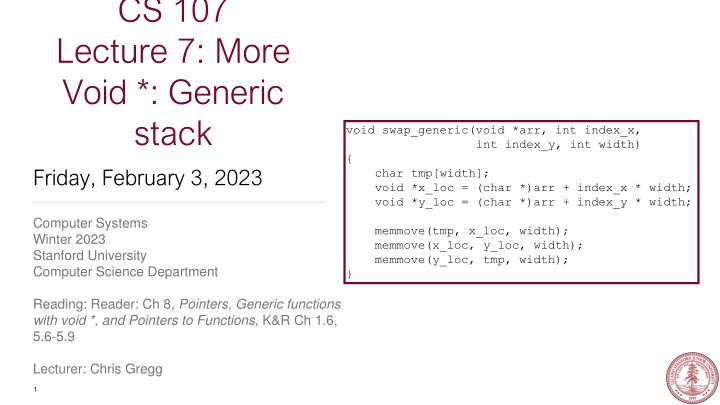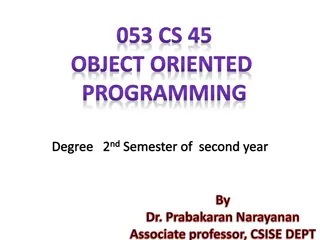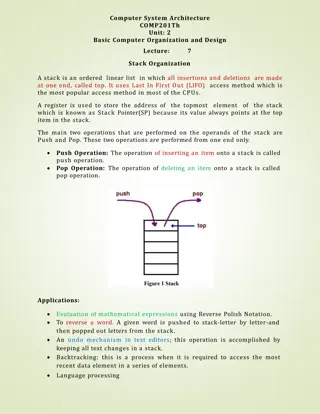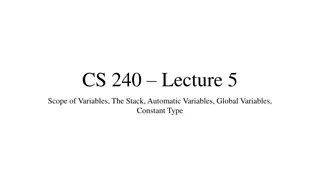
Generic Stack Void Swap Function
Implementing a generic function to swap elements in a stack-like structure using void pointers in C. The function leverages memory manipulation functions like memmove to achieve the swapping functionality. Learn about generic functions, pointers, and generic stacks in this lecture.
Download Presentation

Please find below an Image/Link to download the presentation.
The content on the website is provided AS IS for your information and personal use only. It may not be sold, licensed, or shared on other websites without obtaining consent from the author. If you encounter any issues during the download, it is possible that the publisher has removed the file from their server.
You are allowed to download the files provided on this website for personal or commercial use, subject to the condition that they are used lawfully. All files are the property of their respective owners.
The content on the website is provided AS IS for your information and personal use only. It may not be sold, licensed, or shared on other websites without obtaining consent from the author.
E N D
Presentation Transcript
CS 107 Lecture 7: More Void *: Generic stack void swap_generic(void *arr, int index_x, int index_y, int width) { char tmp[width]; void *x_loc = (char *)arr + index_x * width; void *y_loc = (char *)arr + index_y * width; Friday, February 3, 2023 Computer Systems Winter 2023 Stanford University Computer Science Department memmove(tmp, x_loc, width); memmove(x_loc, y_loc, width); memmove(y_loc, tmp, width); } Reading: Reader: Ch 8, Pointers, Generic functions with void *, and Pointers to Functions, K&R Ch 1.6, 5.6-5.9 Lecturer: Chris Gregg 1
Today's Topics Logistics We have to talk about ChatGPT Reading: Reader: Ch 8, Pointers, Generic functions with void *, and Pointers to Functions Lab: winky, change_char, and change_ptr More on Generic pointers, void * The standard library's qsort A generic stack 2
gdb step, next, finish I've seen a few students who have been frustrated with stepping through functions in gdb. Sometimes, they will accidentally step into a function like strlen or printf and get stuck. There are three important gdb commands about stepping through a program: step (abbreviation: s) : executes the next line and goes into function calls. next (abbreviation: n) : executes the next line, and does not go into function calls. I.e., if you want to run a line with strlen or printf but don't want to attempt to go into that function, use next. display (abbreviation: disp) : displays a variable (or other item) after each step. finish (abbreviation: fin) : completes a function and returns to the calling function. This is the command you want if you accidentally go into a function like strlen or printf! This continues the program until the end of the function, putting you back into the calling function. 3
gdb step, next, finish : example $ gdb print_arr The target architecture is assumed to be i386:x86-64 Reading symbols from print_arr...done. (gdb) b 35 Breakpoint 1 at 0x400700: file print_arr.c, line 35. (gdb) run Starting program: /afs/ir/class/cs107/samples/lect8/print_arr (gdb) s print_long (arr=0x7fffffffe910) at print_arr.c:23 23 long l = *(long *)arr; (gdb) s 24 printf("%ld",l); (gdb) s __printf (format=0x4007dc "%ld") at printf.c:28 28 printf.c: No such file or directory. (gdb) s 32 in printf.c (gdb) n 33 in printf.c (gdb) n 32 in printf.c (gdb) finish Run till exit from #0 __printf (format=0x4007dc "%ld") at printf.c:32 print_long (arr=0x7fffffffe910) at print_arr.c:25 25 } Value returned is $1 = 1 (gdb) where #0 print_long (arr=0x7fffffffe910) at print_arr.c:25 #1 0x00000000004005d8 in print_array (arr=0x7fffffffe910, nelems=6, width=8, pr_func=0x400648 <print_long>) at print_arr.c:10 #2 0x0000000000400734 in main (argc=1, argv=0x7fffffffea38) at print_arr.c:36 Breakpoint 1, main (argc=1, argv=0x7fffffffea38) at print_arr.c:35 35 print_array(i_array,i_nelems,sizeof(i_array[0]),print _int); (gdb) n 0, 1, 2, 3, 4, 5 36 print_array(l_array,l_nelems,sizeof(l_array[0]),print _long); (gdb) s print_array (arr=0x7fffffffe910, nelems=6, width=8, pr_func=0x400648 <print_long>) at print_arr.c:8 8 for (int i=0; i < nelems; i++) { (gdb) s 9 void *element = (char *)arr + i * width; (gdb) s 10 pr_func(element); 4
Example: qsort with an array of structs Last time, we saw that we can use qsort to sort any generic array we want, as long as: 1. We have an array of some type 2. We have a function that can compare two elements of that type when passed two pointers to two of the elements in the array So, let's try to do this with an array of structs. Let's sort a list of rectangles by their area, given that each rectangle is defined by its width and height. E.g.,: typedef struct rect { int width; int height; } rect; 5
Example: qsort with an array of structs First, let's write a function that can compare two pointers to rect structs: struct rect { int width; int height; }; int rect_comp_area(const void *r1, const void *r2) { const struct rect *r1ptr = r1; // no cast necessary const struct rect *r2ptr = r2; int area1 = r1ptr->width * r1ptr->height; int area2 = r2ptr->width * r2ptr->height; return area1 - area2; } 6
Example: qsort with an array of structs Next, let's create a bunch of random rectangles in an array: #include <stdio.h> #include <stdlib.h> #include <time.h> #define NUM_RECTS 100 #define MAX_WIDTH 100 #define MAX_HEIGHT 100 int main(int argc, char **argv) { time_t t; srand((unsigned) time(&t)); // this "seeds" the pseudorandom number generator // create a rect array struct rect rect_arr[NUM_RECTS]; // populate with random rectangles for (int i = 0; i < NUM_RECTS; i++) { struct rect r; r.width = rand() % MAX_WIDTH; // rand() is a number between 0 and RAND_MAX r.height = rand() % MAX_HEIGHT; rect_arr[i] = r; // can copy a struct, all fields copied by value } 7
Example: qsort with an array of structs Next, we run qsort, then print the results: qsort(rect_arr, NUM_RECTS, sizeof(struct rect), rect_comp_area); for (int i = 0; i < NUM_RECTS; i++) { int w = rect_arr[i].width; int h = rect_arr[i].height; printf("w: %d, h: %d, area: %d\n", w, h, w * h); } Output example: $ ./qsort-ex w: 21, h: 1, area: 21 w: 15, h: 3, area: 45 w: 1, h: 64, area: 64 w: 95, h: 80, area: 7600 w: 81, h: 97, area: 7857 w: 99, h: 87, area: 8613 8
Example: qsort with an array of structs Full code: int main(int argc, char **argv) { time_t t; srand((unsigned) time(&t)); // file: qsort-ex.c #include <stdio.h> #include <stdlib.h> #include <time.h> // create a rect array struct rect rect_arr[NUM_RECTS]; struct rect { int width; int height; }; // populate with random rectangles for (int i = 0; i < NUM_RECTS; i++) { struct rect r; r.width = rand() % MAX_WIDTH; r.height = rand() % MAX_HEIGHT; rect_arr[i] = r; } #define NUM_RECTS 100 #define MAX_WIDTH 100 #define MAX_HEIGHT 100 qsort(rect_arr, NUM_RECTS, sizeof(struct rect), rect_comp_area); int rect_comp_area(const void *r1, const void *r2) { const struct rect *r1ptr = r1; const struct rect *r2ptr = r2; int area1 = r1ptr->width * r1ptr->height; int area2 = r2ptr->width * r2ptr->height; return area1 - area2; } for (int i = 0; i < NUM_RECTS; i++) { int w = rect_arr[i].width; int h = rect_arr[i].height; printf("w: %d, h: %d, area: %d\n", w, h, w * h); } return 0; } 9
Example: Building a generic stack Let's build a generic stack. We are going to be using structs extensively for this example, and they are fair game for the midterm exam. So, make sure you understand this example! First, let's remind ourselves what the stack data structure does (back to CS 106B!): 1. A stack is a last-in-first-out data structure that can store elements. The first element in the stack is the last element out of the stack. 2. The push operation adds an element onto the stack 3. The pop operation removes an element from the stack. Note, we are not talking about the program stack, but a generic version of the stack abstract data type! Code at: /afs/ir/class/cs107/lecture-code/lect7 10
Example: Building a generic stack Let's build a generic stack. We are going to be using structs extensively for this example, and they are fair game for the midterm exam. So, make sure you understand this example! We'll start by defining a node that will hold a pointer to a "next" node, and some data: A note on syntax: We are defining a type here (thus, typedef), and we are defining a node to be a "struct node". This is different from C++, where we can just define a struct and use its name. In C, without the typedef, we would constantly have to be referring to "struct node" every time we wanted to use it. We often do this in C, but having a typedef is nice. typedef struct node { struct node *next; void *data; } node; 11
Example: Building a generic stack Let's build a generic stack. We are going to be using structs extensively for this example, and they are fair game for the midterm exam. So, make sure you understand this example! We'll start by defining a node that will hold a pointer to a "next" node, and some data: We don't know anything about the type of thing that data will point to, although the stack itself will know its width. typedef struct node { struct node *next; void *data; } node; 12
Example: Building a generic stack Next, let's build the stack type. It will have a defined width for each node, and it will also keep track of how many elements it holds. It will also keep track of the top of the stack. Again, we want to typedef it so we don't have to continually say "struct stack" when we want to use it. typedef struct stack { int width; int nelems; node *top; } stack; Remember, a node is generic, so this stack can hold any type, although once it has a width defined, all elements you push must have that width. 13
Example: Building a generic stack How do we create a default stack? We could do it manually: stack s1; s1.width = sizeof(int); // store ints s1.nelems = 0; s1.top = NULL; But let's create a function for it, in which case we should use a pointer: stack *s = stack_create(...); 14
Example: Building a generic stack Our stack creation function: stack *stack_create(int width) { stack *s = malloc(sizeof(stack)); s->width = width; s->nelems = 0; s->top = NULL; return s; } Let's investigate... 15
Example: Building a generic stack Our stack creation function: A particular stack must have a set width (otherwise, we would have to pass in the width each time, and this doesn't make sense for pop -- we wouldn't know what type we were popping off!) stack *stack_create(int width) { stack *s = malloc(sizeof(stack)); s->width = width; s->nelems = 0; s->top = NULL; return s; } 16
Example: Building a generic stack Our stack creation function: stack *stack_create(int width) { stack *s = malloc(sizeof(stack)); s->width = width; s->nelems = 0; s->top = NULL; return s; } Get enough memory from the heap to create the stack. 17
Example: Building a generic stack Our stack creation function: stack *stack_create(int width) { stack *s = malloc(sizeof(stack)); s->width = width; s->nelems = 0; s->top = NULL; return s; } Set the initial conditions. 18
Example: Building a generic stack Our stack creation function: stack *stack_create(int width) { stack *s = malloc(sizeof(stack)); s->width = width; s->nelems = 0; s->top = NULL; return s; } Return the pointer to the memory we just requested and initialized. 19
Example: Building a generic stack Let's look at our push function: void stack_push(stack *s, const void *data) { node *new_node = malloc(sizeof(node)); new_node->data = malloc(s->width); memcpy(new_node->data, data, s->width); new_node->next = s->top; s->top = new_node; s->nelems++; } 20
Example: Building a generic stack Let's look at our push function: void stack_push(stack *s, const void *data) { node *new_node = malloc(sizeof(node)); new_node->data = malloc(s->width); memcpy(new_node->data,data,s->width); new_node->next = s->top; s->top = new_node; s->nelems++; } The stack function takes a stack as a parameter! The stack isn't an object, and it doesn't have functions built in. If we really wanted to, we could create a stack struct that has function pointers, but that is more advanced. A pointer to the data is also required. 21
Example: Building a generic stack Let's look at our push function: void stack_push(stack *s, const void *data) { node *new_node = malloc(sizeof(node)); new_node->data = malloc(s->width); memcpy(new_node->data,data,s->width); new_node->next = s->top; s->top = new_node; s->nelems++; } Each time we add an element to the stack, we need to create a node, and we get that off the heap, too. 22
Example: Building a generic stack Let's look at our push function: void stack_push(stack *s, const void *data) { node *new_node = malloc(sizeof(node)); new_node->data = malloc(s->width); memcpy(new_node->data,data,s->width); new_node->next = s->top; s->top = new_node; s->nelems++; } Guess what? We also have to use heap memory to store the data! We are making a copy of the data, not just pointing to it! 23
Example: Building a generic stack Let's look at our push function: void stack_push(stack *s, const void *data) { node *new_node = malloc(sizeof(node)); new_node->data = malloc(s->width); memcpy(new_node->data, data, s->width); new_node->next = s->top; s->top = new_node; s->nelems++; } We copy the data pointed to into our node. This could be anything, but we know the width. If it is a pointer, we'll copy the pointer, but it could be integer data, or any other kind of data. 24
Example: Building a generic stack Let's look at our push function: void stack_push(stack *s, const void *data) { node *new_node = malloc(sizeof(node)); new_node->data = malloc(s->width); memcpy(new_node->data, data, s->width); new_node->next = s->top; s->top = new_node; s->nelems++; } We have to do some wiring here (kind of like linked lists). We are inserting this node before the top of the stack. 25
Example: Building a generic stack Let's look at our push function: void stack_push(stack *s, const void *data) { node *new_node = malloc(sizeof(node)); new_node->data = malloc(s->width); memcpy(new_node->data, data, s->width); new_node->next = s->top; s->top = new_node; s->nelems++; } Don't forget to update the number of elements. 26
Example: Building a generic stack Let's look at our pop function. Pop will copy data back into a memory location we give it, instead of returning a pointer -- this preserves the encapsulation of our data. bool stack_pop(stack *s, void *addr) { if (s->nelems == 0) { return false; } node *n = s->top; memcpy(addr, n->data, s->width); // rewire s->top = n->next; free(n->data); free(n); s->nelems--; return true; } 27
Example: Building a generic stack Let's look at our pop function. Pop will copy data back into a memory location we give it, instead of returning a pointer -- this preserves the encapsulation of our data. Let's return a boolean value to say whether or not we had an element to return. In other words, if the stack is empty, return false; otherwise, return true. bool stack_pop(stack *s, void *addr) { if (s->nelems == 0) { return false; } node *n = s->top; memcpy(addr, n->data, s->width); // rewire s->top = n->next; free(n->data); free(n); s->nelems--; return true; } 28
Example: Building a generic stack Let's look at our pop function. Pop will copy data back into a memory location we give it, instead of retiring a pointer -- this preserves the encapsulation of our data. Again, pop has a stack argument, and a pointer to a memory location to hold the data we are going to copy. bool stack_pop(stack *s, void *addr) { if (s->nelems == 0) { return false; } node *n = s->top; memcpy(addr, n->data, s->width); // rewire s->top = n->next; free(n->data); free(n); s->nelems--; return true; } 29
Example: Building a generic stack Let's look at our pop function. Pop will copy data back into a memory location we give it, instead of retiring a pointer -- this preserves the encapsulation of our data. Check to see if the stack is empty. bool stack_pop(stack *s, void *addr) { if (s->nelems == 0) { return false; } node *n = s->top; memcpy(addr, n->data, s->width); // rewire s->top = n->next; free(n->data); free(n); s->nelems--; return true; } 30
Example: Building a generic stack Let's look at our pop function. Pop will copy data back into a memory location we give it, instead of retiring a pointer -- this preserves the encapsulation of our data. bool stack_pop(stack *s, void *addr) { if (s->nelems == 0) { return false; } node *n = s->top; memcpy(addr, n->data, s->width); // rewire s->top = n->next; Might as well create a temporary pointer so we don't have to do a bunch of double "->" references. free(n->data); free(n); s->nelems--; return true; } 31
Example: Building a generic stack Let's look at our pop function. Pop will copy data back into a memory location we give it, instead of retiring a pointer -- this preserves the encapsulation of our data. bool stack_pop(stack *s, void *addr) { if (s->nelems == 0) { return false; } node *n = s->top; memcpy(addr, n->data, s->width); // rewire s->top = n->next; We'll copy the data back to the memory location we were provided. free(n->data); free(n); s->nelems--; return true; } 32
Example: Building a generic stack Let's look at our pop function. Pop will copy data back into a memory location we give it, instead of retiring a pointer -- this preserves the encapsulation of our data. bool stack_pop(stack *s, void *addr) { if (s->nelems == 0) { return false; } node *n = s->top; memcpy(addr, n->data, s->width); // rewire s->top = n->next; Re-wiring is pretty easy -- the top is now just the next element in the stack. free(n->data); free(n); s->nelems--; return true; } 33
Example: Building a generic stack Let's look at our pop function. Pop will copy data back into a memory location we give it, instead of retiring a pointer -- this preserves the encapsulation of our data. bool stack_pop(stack *s, void *addr) { if (s->nelems == 0) { return false; } node *n = s->top; memcpy(addr, n->data, s->width); // rewire s->top = n->next; We have to clean up. First, we free the data (remember, we malloc'd it originally!) free(n->data); free(n); s->nelems--; return true; } 34
Example: Building a generic stack Let's look at our pop function. Pop will copy data back into a memory location we give it, instead of retiring a pointer -- this preserves the encapsulation of our data. bool stack_pop(stack *s, void *addr) { if (s->nelems == 0) { return false; } node *n = s->top; memcpy(addr, n->data, s->width); // rewire s->top = n->next; free(n->data); free(n); s->nelems--; return true; } Then, we free the node itself (because we malloc'd it!) 35
Example: Building a generic stack Let's look at our pop function. Pop will copy data back into a memory location we give it, instead of retiring a pointer -- this preserves the encapsulation of our data. bool stack_pop(stack *s, void *addr) { if (s->nelems == 0) { return false; } node *n = s->top; memcpy(addr, n->data, s->width); // rewire s->top = n->next; free(n->data); free(n); s->nelems--; return true; } Don't forget to decrement the number of elements! 36
Example: Building a generic stack Let's look at our pop function. Pop will copy data back into a memory location we give it, instead of retiring a pointer -- this preserves the encapsulation of our data. bool stack_pop(stack *s, void *addr) { if (s->nelems == 0) { return false; } node *n = s->top; memcpy(addr, n->data, s->width); // rewire s->top = n->next; free(n->data); free(n); s->nelems--; return true; } We did have an element to return, so we return true. 37
Example: Building a generic stack Now we can try it. Let's push on an array of ints, and then pop them all off: int main(int argc, char **argv) { // start with an int array int iarr[] = {0, 2, 4, 6, 8, 12345678, 24680}; int nelems = sizeof(iarr) / sizeof(iarr[0]); What is the size of each element? stack *intstack = stack_create(sizeof(iarr[0])); for (int i=0; i < nelems; i++) { stack_push(intstack, iarr + i); } int popped_int; while (stack_pop(intstack, &popped_int)) { printf("%d\n", popped_int); } free(s); // clean up! return 0; } 38
Example: Building a generic stack Now we can try it. Let's push on an array of ints, and then pop them all off: int main(int argc, char **argv) { // start with an int array int iarr[] = {0, 2, 4, 6, 8, 12345678, 24680}; int nelems = sizeof(iarr) / sizeof(iarr[0]); What is the size of each element? 4 (because we will be storing ints in the stack) stack *intstack = stack_create(sizeof(iarr[0])); for (int i=0; i < nelems; i++) { stack_push(intstack, iarr + i); } int popped_int; while (stack_pop(intstack, &popped_int)) { printf("%d\n", popped_int); } free(s); // clean up! return 0; } 39
Example: Building a generic stack Now we can try it. Let's push on an array of ints, and then pop them all off: int main(int argc, char **argv) { // start with an int array int iarr[] = {0, 2, 4, 6, 8, 12345678, 24680}; int nelems = sizeof(iarr) / sizeof(iarr[0]); $ ./stack 24680 12345678 8 6 4 2 0 7 stack *intstack = stack_create(sizeof(iarr[0])); for (int i=0; i < nelems; i++) { stack_push(intstack, iarr + i); } int popped_int; while (stack_pop(intstack, &popped_int)) { printf("%d\n", popped_int); } free(s); // clean up! return 0; } 40
Example: Building a generic stack Let's try and push one more int onto the stack (assume we do this before the call to free: int main(int argc, char **argv) { ... int x = 42; stack_push(intstack, x); Does this work? Recall: void stack_push(stack *s, const void *data) 41
Example: Building a generic stack Let's try and push one more int onto the stack (assume we do this before the call to free: int main(int argc, char **argv) { ... int x = 42; stack_push(intstack, x); Does this work? Recall: void stack_push(stack *s, const void *data) This does not work -- we need a pointer to x. So, we should do: stack_push(intstack, &x); 42
Example: Building a generic stack Let's go ahead and use an array of char * pointers -- remember, our stack is generic, and will work for any pointer! Let's push all the command line args onto the stack: stack *s = stack_create(sizeof(argv[0])); for (int i=1; i < argc; i++) { stack_push(s,argv+i); } What is the size of each element? char *next_arg; while (stack_pop(s,&next_arg)) { printf("%s\n",next_arg); } We're pushing on all but the program name. 43
Example: Building a generic stack Let's go ahead and use an array of char * pointers -- remember, our stack is generic, and will work for any pointer! Let's push all the command line args onto the stack: stack *s = stack_create(sizeof(argv[0])); for (int i=1; i < argc; i++) { stack_push(s,argv+i); } What is the size of each element? 8 char *next_arg; while (stack_pop(s,&next_arg)) { printf("%s\n",next_arg); } because the size of a char * pointer is 8. We're pushing on all but the program name. 44
Example: Building a generic stack Let's go ahead and use an array of char * pointers -- remember, our stack is generic, and will work for any pointer! Let's push all the command line args onto the stack: stack *s = stack_create(sizeof(argv[0])); for (int i=1; i < argc; i++) { stack_push(s,argv+i); } $ ./stack here are some words words some are here char *next_arg; while (stack_pop(s,&next_arg)) { printf("%s\n",next_arg); } We're pushing on all but the program name. 45
Example: Building a generic stack Can we push on one more string? ... string *h = "hello"; stack_push(s, h); This should work, right? h is a pointer! Recall: void stack_push(stack *s, const void *data) 46
Example: Building a generic stack Can we push on one more string? ... string *h = "hello"; stack_push(s,h); This should work, right? h is a pointer! Recall: void stack_push(stack *s, const void *data) This doesn't work! We need a pointer to the memory we are pushing onto the stack. We aren't pushing string characters, we are pushing a string pointer! So, we need: stack_push(s, &h); // &h is a char ** 47
References and Advanced Reading References: K&R C Programming (from our course) Course Reader, C Primer Awesome C book: http://books.goalkicker.com/CBook Function Pointer tutorial: https://www.cprogramming.com/tutorial/function- pointers.html Advanced Reading: virtual memory: https://en.wikipedia.org/wiki/Virtual_memory 48
Extra Slides 49

![[PDF⚡READ❤ONLINE] Gemini 4: An Astronaut Steps into the Void (Springer Praxis B](/thumb/21620/pdf-read-online-gemini-4-an-astronaut-steps-into-the-void-springer-praxis-b.jpg)




















